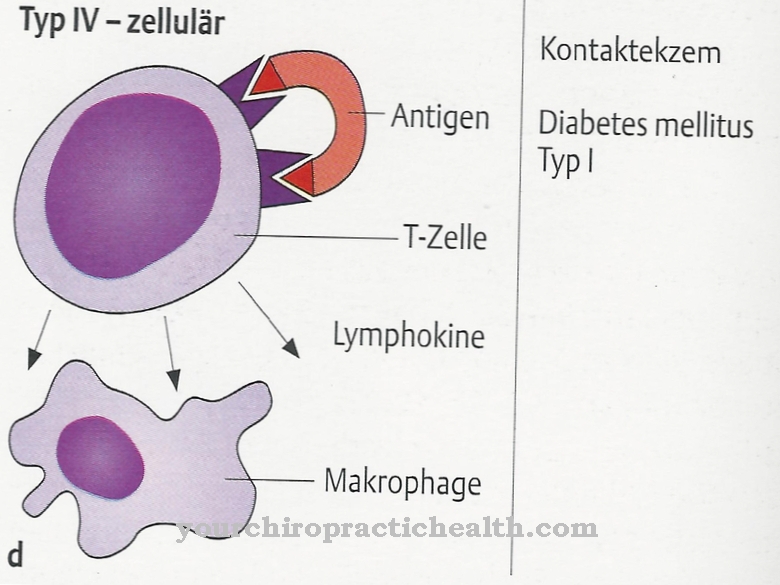In the Adjustment disorder it is a mental illness in which the person concerned reacts with various psychological symptoms after a decisive change in life, for example a change of job, move, a pension, etc.
What is adjustment disorder?

© olly - stock.adobe.com
An adjustment disorder means that the person concerned reacts to a stressful life event. This can be expressed in a negative change in his state of mind or in a disturbed, interpersonal behavior. The disorder occurs when he is unable to adapt to the difficult new situation that has arisen over a long period of time because he is unable to accept it psychologically or physically.
It is characteristic that he feels subjectively oppressed and emotionally impaired. Social relationships and productivity are limited in an adjustment disorder. This can lead to a high level of suffering for the person concerned.
causes
People can usually adapt to changing situations or events. It is different with an adjustment disorder, which can affect all age groups, because the person affected is not able to do so. Psychological symptoms occur for which there are various reasons as the cause, for example if the changes that have occurred are too stressful or several changes occur at the same time that lead to psychological overload.
Sometimes the sufferer does not have adequate coping strategies. Triggering stress factors can be, for example, prolonged conflicts in the private or professional environment, illnesses, deaths, financial problems, moving house, the birth of a child and much more. It can be almost any stressful event that can occur in life. This includes negative, but also positive situations.
It does not matter how hard the event is, but how the stress is felt subjectively, how many difficult events there may have been in advance, how resilient the person concerned is and how he manages to cope with the situation. It depends on whether there is an adjustment disorder and the severity of the result. The risk of an adjustment disorder may also be higher if the sufferer experienced stress in early childhood. The adjustment disorder usually lasts for a maximum of six months.
You can find your medication here
➔ Medicines to calm down and strengthen nervesSymptoms, ailments & signs
The symptoms of an adjustment disorder can be varied and manifest themselves, for example, in the form of a depressive mood. Fears, worries, anger, bitterness, restlessness, sadness, despair, emotional confusion, a dip in mood and sleep problems are typical complaints.
The person concerned often has the feeling that he can no longer cope with the circumstances of everyday life and cannot continue because he believes that he is no longer up to the everyday tasks. Feelings of isolation and distress can also arise with an adjustment disorder. A lack of interest, problems with concentration as well as the increasing loss of zest for life can lead to the social behavior and the performance of the person affected being considerably restricted.
The consequences are often social withdrawal and even aggressiveness. In addition to psychological problems, an adjustment disorder can also cause somatic complaints, such as digestive disorders and tension.
Diagnosis & course
If an adjustment disorder is suspected, the psychiatrist and psychotherapist asks first of all what symptoms are present, how often and how severe they occur. He then determines whether the person affected is able to cope with his everyday life or whether the disorder has already assumed such dimensions that he can no longer pursue his job or look after the children, for example.
The medical professional uses the result of the conversation as a basis for checking whether it is a normal reaction to a stressful event or an adjustment disorder that requires treatment. This also provides results as to which resources are available for coping with the stress, that is, the adjustment disorder, in the person affected.
Complications
An adjustment disorder is usually treated by a psychologist or a psychiatrist and is not a physical illness. With an adjustment disorder, the person affected often feels alone and insecure, which often leads to a feeling of distress. Those affected often let this feeling out on their friends and relatives.
This results in changed social behavior and social withdrawal. People with adjustment disorders are often plagued by a feeling of emptiness or increased concern about a particular past or future issue. Joylessness, grief, and fear are also common complications of adjustment disorder. The signs vary widely, and most of them all result in a depressed mood, anxiety, and worry.
Treatment takes place either through talks in therapy or through a drug. Therapy does not usually take effect immediately; it takes time before the adjustment disorder can be treated. The person concerned complains of feelings of fear and can no longer cope with everyday life alone. This affects social behavior, especially among young people.
In a few cases, those affected also lose their jobs, fall into severe depression and also begin to have suicidal thoughts. Friends and relatives should definitely stand by their side if they have an adjustment disorder and also inform a doctor about it.
When should you go to the doctor?
Many people suffer from adjustment disorders in the course of their lives - triggered by stressful living conditions and serious changes in life. If the symptoms of adjustment disorder are so severe that a normal everyday life is no longer possible, those affected should see a doctor immediately.
If you can no longer find your way around in your current life and symptoms such as restlessness, nervousness, social withdrawal, depression and sleep disorders significantly reduce your quality of life, a visit to the family doctor is recommended.
The family doctor, as a trusted doctor, can get an initial picture of the individual complaints and then write a referral to a specialist. The specialist in psychiatry can treat the stressful symptoms with medication or give a recommendation for psychotherapy. In most cases, adjustment disorder can be treated well with psychotherapy.
Emotional relief can be achieved by discussing current problems and thoughts. Psychotherapy should help you to cope better with the new circumstances and find individual solutions to your problems. The supportive discussions can have a positive effect on the patient's mind and have a relieving effect. Psychotherapy can also be used to find and practice new ways of dealing better with stressful living conditions in the future.
Doctors & therapists in your area
Treatment & Therapy
The most important option for treating an adjustment disorder is psychotherapy, which also acts as counseling. Therapy can provide emotional support and help bring the person back to normal routine. Also, this treatment offers a good chance of understanding why the adjustment disorder occurred.
Understanding the causes can learn to develop healthy coping strategies to better deal with other stressful events that may arise later in life. It is always important that this is recognized in good time and counteracted.
In some cases, when conversations are not enough, drugs are used to help with symptoms such as depression, anxiety, or even suicidal thoughts. Antidepressants as well as anti-anxiety medications have proven to be effective in an adjustment disorder.
Outlook & forecast
An adjustment disorder can last from a few weeks to many years. Some doctors and psychologists tend to view the adjustment disorder as “benign” because in many cases it resolves completely or can be treated successfully. Most adjustment disorders get better or go away completely within six months.
However, psychologists and doctors no longer speak of an adjustment disorder if the symptoms persist for more than six months. In reactive depression, this time limit is extended to two years. This diagnostic guideline may skew the actual prognosis for adjustment disorders.
So far, there are only a few studies that specifically deal with the adjustment disorder. This is another reason why the prognosis is often unclear. In addition, adjustment disorders are very diverse. Since adjustment disorders cover a wide spectrum and can have many different triggers, the prognosis depends heavily on the individual case and its respective conditions. The more resources an affected person has and uses, the more likely the condition will improve.
The psychological complaints that make up the adjustment disorder can become chronic and thus persist for several years. An example of such a process is chronic grief. Adjustment disorders caused by migration and the associated “culture shock” often improve when the person has settled into their new environment and is well integrated.
You can find your medication here
➔ Medicines to calm down and strengthen nervesprevention
There is no way to definitely prevent an adjustment disorder, but there is a chance to develop healthy coping strategies, for example to deal with it in times of high stress. It is also helpful to have a healthy lifestyle with enough recovery phases to create a healthy balance.
Exercise, yoga and meditation are also very good at being able to be balanced, react appropriately in difficult situations and thus prevent an adjustment disorder. Many factors play an important role.
Aftercare
As a rule, those affected with an adjustment disorder have no special follow-up options available. However, these are not always necessary as the adjustment disorder should primarily be treated by a doctor. After successful treatment, care should be taken to ensure that these disorders do not recur and are avoided.
In most cases, this disorder is treated with therapy from a psychologist. Above all, early treatment should be initiated to prevent further symptoms and complications. Friends and family should make people aware of the symptoms of adjustment disorder and seek treatment from a doctor.
In some cases, the disease is also supported with the help of medication, so that it is important to take it regularly. Possible interactions with other drugs can also occur. The support of family and friends often has a very positive effect on the further course of the disease and can prevent further complications and complaints. The adjustment disorder does not reduce the life expectancy of the person affected.
You can do that yourself
More and more people have to struggle with serious stresses in everyday life, which can have serious effects on the body and mind of people. Since an adjustment disorder often manifests itself in negative moods and interpersonal disorders of social behavior, it is difficult to hide it in social life.
Since the adjustment disorder is often the result of stressful times, it can best be alleviated with sufficient rest for regeneration. Those affected should plan enough time for themselves in everyday life. Since the adjustment disorder is usually limited in time, friends and family can provide support during this difficult time and help the person affected. Another self-help method for adjustment disorders are so-called relaxation exercises and meditations, in which the person affected can feel himself well and let go of the stresses of life.
Some people, on the other hand, need intense physical activity to relieve stress and regain a sense of wellbeing. Since every person is individual, everyone should research for themselves what is good for them. With sports units, relaxation exercises, periods of rest, etc., the symptoms of an adjustment disorder can be alleviated so that the person affected regains his strength and can actively participate in life.




.jpg)



















.jpg)



